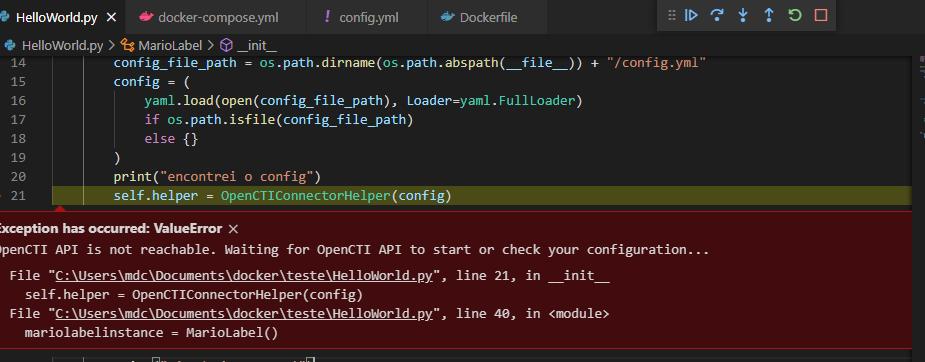Connect two containers through docker network
Answer a question My objective is connect two different containers to get data, in other words: I have an instance of OpenCTI working in my docker , and I can access it through my browser (http://loca
Answer a question
My objective is connect two different containers to get data, in other words:
- I have an instance of OpenCTI working in my docker , and I can access it through my browser (http://localhost:8080).
- Consequently, I am developing another one to get data from OpenCTI.
To connect both, I already created a docker network called "minharede".
However is not working.
The configuration of my containers is:
Docker-compose file of OpenCTI:
version: '3'
services:
redis:
image: redis:6.2.6
restart: always
volumes:
- redisdata:/data
elasticsearch:
image: docker.elastic.co/elasticsearch/elasticsearch:7.17.1
volumes:
- esdata:/usr/share/elasticsearch/data
environment:
- discovery.type=single-node
- xpack.ml.enabled=false
restart: always
ulimits:
memlock:
soft: -1
hard: -1
nofile:
soft: 65536
hard: 65536
minio:
image: minio/minio:RELEASE.2022-02-26T02-54-46Z
volumes:
- s3data:/data
ports:
- "9800:9800"
environment:
MINIO_ROOT_USER: ${MINIO_ROOT_USER}
MINIO_ROOT_PASSWORD: ${MINIO_ROOT_PASSWORD}
command: server /data
healthcheck:
test: ["CMD", "curl", "-f", "http://localhost:9000/minio/health/live"]
interval: 30s
timeout: 20s
retries: 3
restart: always
rabbitmq:
image: rabbitmq:3.9-management
environment:
- RABBITMQ_DEFAULT_USER=${RABBITMQ_DEFAULT_USER}
- RABBITMQ_DEFAULT_PASS=${RABBITMQ_DEFAULT_PASS}
volumes:
- amqpdata:/var/lib/rabbitmq
restart: always
opencti:
image: opencti/platform:5.2.1
environment:
- NODE_OPTIONS=--max-old-space-size=8096
- APP__PORT=8080
- APP__ADMIN__EMAIL=${OPENCTI_ADMIN_EMAIL}
- APP__ADMIN__PASSWORD=${OPENCTI_ADMIN_PASSWORD}
- APP__ADMIN__TOKEN=${OPENCTI_ADMIN_TOKEN}
- APP__APP_LOGS__LOGS_LEVEL=error
- REDIS__HOSTNAME=redis
- REDIS__PORT=6379
- ELASTICSEARCH__URL=http://elasticsearch:9200
- MINIO__ENDPOINT=minio
- MINIO__PORT=9000
- MINIO__USE_SSL=false
- MINIO__ACCESS_KEY=${MINIO_ROOT_USER}
- MINIO__SECRET_KEY=${MINIO_ROOT_PASSWORD}
- RABBITMQ__HOSTNAME=rabbitmq
- RABBITMQ__PORT=5672
- RABBITMQ__PORT_MANAGEMENT=15672
- RABBITMQ__MANAGEMENT_SSL=false
- RABBITMQ__USERNAME=${RABBITMQ_DEFAULT_USER}
- RABBITMQ__PASSWORD=${RABBITMQ_DEFAULT_PASS}
- SMTP__HOSTNAME=${SMTP_HOSTNAME}
- SMTP__PORT=25
- PROVIDERS__LOCAL__STRATEGY=LocalStrategy
ports:
- "8080:8080"
depends_on:
- redis
- elasticsearch
- minio
- rabbitmq
restart: always
worker:
image: opencti/worker:5.2.1
environment:
- OPENCTI_URL=http://opencti:8080
- OPENCTI_TOKEN=${OPENCTI_ADMIN_TOKEN}
- WORKER_LOG_LEVEL=info
depends_on:
- opencti
deploy:
mode: replicated
replicas: 3
restart: always
connector-history:
image: opencti/connector-history:5.2.1
environment:
- OPENCTI_URL=http://opencti:8080
- OPENCTI_TOKEN=${OPENCTI_ADMIN_TOKEN}
- CONNECTOR_ID=${CONNECTOR_HISTORY_ID} # Valid UUIDv4
- CONNECTOR_TYPE=STREAM
- CONNECTOR_NAME=History
- CONNECTOR_SCOPE=history
- CONNECTOR_CONFIDENCE_LEVEL=15 # From 0 (Unknown) to 100 (Fully trusted)
- CONNECTOR_LOG_LEVEL=info
restart: always
depends_on:
- opencti
connector-export-file-stix:
image: opencti/connector-export-file-stix:5.2.1
environment:
- OPENCTI_URL=http://opencti:8080
- OPENCTI_TOKEN=${OPENCTI_ADMIN_TOKEN}
- CONNECTOR_ID=${CONNECTOR_EXPORT_FILE_STIX_ID} # Valid UUIDv4
- CONNECTOR_TYPE=INTERNAL_EXPORT_FILE
- CONNECTOR_NAME=ExportFileStix2
- CONNECTOR_SCOPE=application/json
- CONNECTOR_CONFIDENCE_LEVEL=15 # From 0 (Unknown) to 100 (Fully trusted)
- CONNECTOR_LOG_LEVEL=info
restart: always
depends_on:
- opencti
connector-export-file-csv:
image: opencti/connector-export-file-csv:5.2.1
environment:
- OPENCTI_URL=http://opencti:8080
- OPENCTI_TOKEN=${OPENCTI_ADMIN_TOKEN}
- CONNECTOR_ID=${CONNECTOR_EXPORT_FILE_CSV_ID} # Valid UUIDv4
- CONNECTOR_TYPE=INTERNAL_EXPORT_FILE
- CONNECTOR_NAME=ExportFileCsv
- CONNECTOR_SCOPE=text/csv
- CONNECTOR_CONFIDENCE_LEVEL=15 # From 0 (Unknown) to 100 (Fully trusted)
- CONNECTOR_LOG_LEVEL=info
restart: always
depends_on:
- opencti
connector-export-file-txt:
image: opencti/connector-export-file-txt:5.2.1
environment:
- OPENCTI_URL=http://opencti:8080
- OPENCTI_TOKEN=${OPENCTI_ADMIN_TOKEN}
- CONNECTOR_ID=${CONNECTOR_EXPORT_FILE_TXT_ID} # Valid UUIDv4
- CONNECTOR_TYPE=INTERNAL_EXPORT_FILE
- CONNECTOR_NAME=ExportFileTxt
- CONNECTOR_SCOPE=text/plain
- CONNECTOR_CONFIDENCE_LEVEL=15 # From 0 (Unknown) to 100 (Fully trusted)
- CONNECTOR_LOG_LEVEL=info
restart: always
depends_on:
- opencti
connector-import-file-stix:
image: opencti/connector-import-file-stix:5.2.1
environment:
- OPENCTI_URL=http://opencti:8080
- OPENCTI_TOKEN=${OPENCTI_ADMIN_TOKEN}
- CONNECTOR_ID=${CONNECTOR_IMPORT_FILE_STIX_ID} # Valid UUIDv4
- CONNECTOR_TYPE=INTERNAL_IMPORT_FILE
- CONNECTOR_NAME=ImportFileStix
- CONNECTOR_VALIDATE_BEFORE_IMPORT=true # Validate any bundle before import
- CONNECTOR_SCOPE=application/json,text/xml
- CONNECTOR_AUTO=true # Enable/disable auto-import of file
- CONNECTOR_CONFIDENCE_LEVEL=15 # From 0 (Unknown) to 100 (Fully trusted)
- CONNECTOR_LOG_LEVEL=info
restart: always
depends_on:
- opencti
connector-import-document:
image: opencti/connector-import-document:5.2.1
environment:
- OPENCTI_URL=http://opencti:8080
- OPENCTI_TOKEN=${OPENCTI_ADMIN_TOKEN}
- CONNECTOR_ID=${CONNECTOR_IMPORT_DOCUMENT_ID} # Valid UUIDv4
- CONNECTOR_TYPE=INTERNAL_IMPORT_FILE
- CONNECTOR_NAME=ImportDocument
- CONNECTOR_VALIDATE_BEFORE_IMPORT=true # Validate any bundle before import
- CONNECTOR_SCOPE=application/pdf,text/plain,text/html
- CONNECTOR_AUTO=true # Enable/disable auto-import of file
- CONNECTOR_ONLY_CONTEXTUAL=false # Only extract data related to an entity (a report, a threat actor, etc.)
- CONNECTOR_CONFIDENCE_LEVEL=15 # From 0 (Unknown) to 100 (Fully trusted)
- CONNECTOR_LOG_LEVEL=info
- IMPORT_DOCUMENT_CREATE_INDICATOR=true
restart: always
depends_on:
- opencti
networks:
default:
external:
name: minharede #network created for the purpose
volumes:
esdata:
s3data:
redisdata:
amqpdata:
Docker-Compose file Container B:
version: '3.4'
services:
teste:
image: teste
build:
context: .
dockerfile: ./Dockerfile
networks:
default:
external:
name: minharede #docker network created for the purpose
The config.yml of container B is:
opencti:
url: "http://localhost:8080"
token: "xxxxxxxxxxxxxxxxxxxxxxxxxxx" #is hidden to post here
connector:
id: "245b2de5-b85e-4236-bedd-97540b133ea2"
type: "INTERNAL_ENRICHMENT"
name: "osthreatenrichment"
scope: "IPv4-Addr, IPv6-Addr, Domain-Name"
auto: true
confidence_level: 70 #From 0 (unknown) to 100 (Fully trusted)
log_level: "info"
When I try to run my container B on Visual Code to test it (it's connected to the docker), I get this error:
Exception has occurred: ValueError OpenCTI API is not reachable. Waiting for OpenCTI API to start or check your configuration...
Anyone can helpe me?? Thank you guys!
(image attached) 
Answers
First of all, during debug in VSCode that is connected to the Docker, the container in development (Cntainer B) connects a default network, in my case was a network called "bridge" . Consequently, I wasn't getting a connection to the same network that container OpenCTI and to solve this I performed the reverse, I connected the container OpenCTI to the network "bridge" where my container in development is connected. After that, I went to check the IP address of the service in my container OpenCTI that I wanted get a connection from container B, and I changed the url from http://opencti:8080 to http://172.xx.x.x:8080(you only have to replace xx by the correct numbers of the IP address) and worked fine for me!!
更多推荐
 已为社区贡献35529条内容
已为社区贡献35529条内容







所有评论(0)